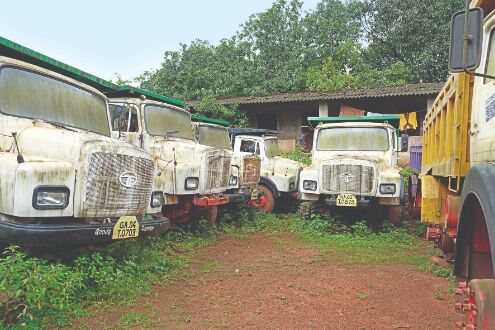Weighing the options
For the sake of pragmatism, the mining ban in Goa must be reconsidered

Increasing reliance on the courts and on judicial means for addressing core moral dilemmas, political disagreements and public policy questions is arguably one of the most consequential phenomena of the late 20th and early 21st-century government. The situation is no different in a democratic country like India where a series of social, political, and economic shifts are reshaping the nation's socio-economic fabric.
Equipped with the power of judicial review, the Supreme Court of India has been resolving a range of issues, varying from the scope of expression and religious liberties, reproductive and privacy freedoms, equality rights, to public policies pertaining to criminal justice, education, labour, and environmental protection. This has brought praise to the honourable court from all quarters though there are still some cases pending which need to be examined afresh.
The State of Goa today holds a very unenviable record of unemployment and livelihood crisis. Unfortunately, it is the judicial system and not natural calamities or extraneous factors which have caused it to happen.
Ever since the Supreme Court of India abruptly suspended the renewal orders of 88 mining leases in the state on February 7, 2018, a sizable mining-dependent section in the State of Goa are left without a meaningful employment or viable alternatives.
Mining has always been an integral part of Goa's economy and can play a strategic role in shaping the State's inclusive and robust development. More so for those who were employed within the mining sector and supporting industries. The sector plays a prominent role in socio-economic upliftment and transformation within the State making it important to have a roadmap for the Goa mining industry and the communities it supports.
Jobs are stressed in the mining sector due to multiple policy and judicial constraints. And since mining communities comprise people on the margins of society, it is important that the concerns and challenges of these communities are accorded due gravitas for the overall health and development of the sector and its people. It is imperative to keep the communities, dependent on mining, engaged and connected through activities such as sports, vocational training, etc., with a hope for a better tomorrow.
Due to the mining stoppage, a considerable population in the State of Goa has limited employment alternatives and there is little hope of improvement in their plight as the COVID-19 lockdown has further inflicted the State's tourism industry and other service sectors plunging the state into a huge socio-economic crisis and rising debts, Clearly not a comfortable situation.
The impact of the mining ban has been quite far-reaching on the State of Goa. It is not only restricted to mining workers and their dependents. It has disrupted an entire ecosystem of allied industries from logistics of waterways such as barges and ferries to surface transport comprising trucks and earth movers.
The ban has shuddered to a halt the entire system built around mining operations. Small wonder then that post the mining ban, more than 12,000 trucks, 150 barges, and an equal number of ancillary units are rusting away.
With no work and an inevitable debt burden, a huge financial crisis is now looming in the once-prosperous State of Goa. And now with a huge net performing asset (NPA) crisis in the offing, how it will impact the already stressed economy of the State is anyone's guess.
Unemployment casts a long shadow on future income expectations and economic recovery. A look at the growth of the US mafia around the time of the Great Depression in the 1930s, which severely affected every segment of the US economy, points to the high degree of correlation between crime and unemployment.
The psychological and social costs of prolonged periods of unemployment can push households into debt and increase rates of relative poverty. This is evident in the State of Goa where individuals and their families, dependent on the mining and allied industries, are facing deterioration in the quality of life post the mining stoppage.
Not to mention experiences of low self-esteem and loss of self-identity that can impact physical and mental health as well. It may lead to social isolation and the loss of social networks and support. This is besides family disruption and breakdown due to redundancy.
The rule of law provides modern societies with stability and a clear system for resolving conflicts. It makes possible to find the solution to the current stalemate in Goa within the confines of the law. In doing so, not only will the state be helped to get back on its feet, but also the affected population will be saved from a life of penury, and worse, of crime.
What is really needed, is legal pragmatism.
The writer is the Secretary, Goa Mineral Ore Exporters Association



